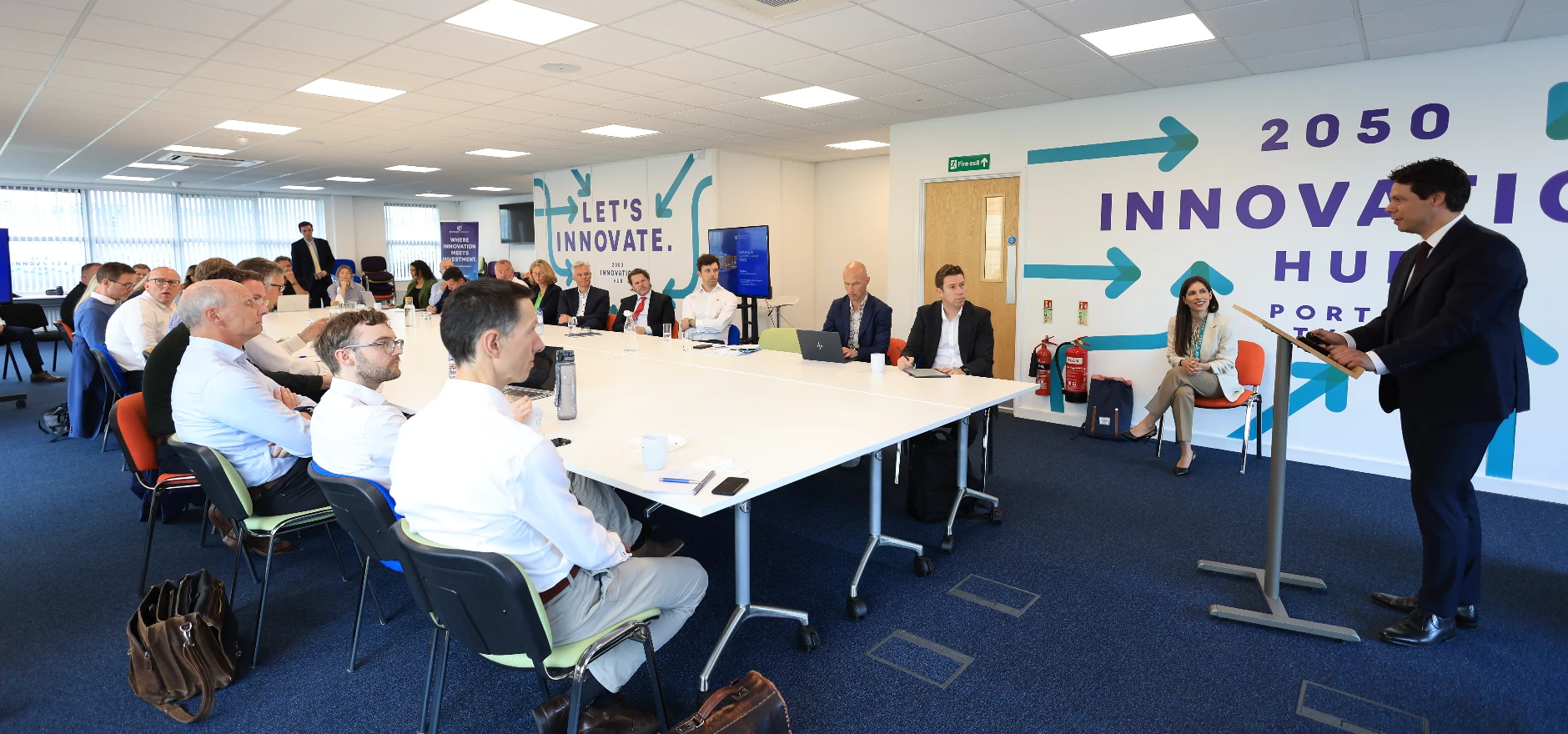
Port of Tyne helps chart greener course
A North East maritime hub is helping shape the future of low-carbon shipping between the UK and Europe.
The Port of Tyne welcomed UK and European stakeholders to its 2050 Maritime Innovation Hub to share progress on its “flagship” Green North Sea Shipping Corridor Project, which aims to decarbonise ferry transport and support green jobs.
Representatives from the Netherlands Ministry of Infrastructure and Water Management, the UK Department for Transport and Innovate UK joined the session to review results from recent feasibility studies and technical assessments.
Launched in November 2024, the corridor is part of a £9 million initiative co-funded by the UK Government and industry, under the International Green Corridors Fund.
The route will link the Port of Tyne with the Port of IJmuiden and enable ferry operator DFDS to adopt methanol-powered RoPax vessels by the end of the decade.
Key findings were presented by Rolph Spaas, partner at Darel Consultancy, who shared conclusions from studies on behalf of the Port of IJmuiden.
The assessments confirmed the port could be upgraded to receive DFDS’s next-generation ships with targeted structural and operational changes.
Teun Wim Leene, route director at DFDS, added: “This project is a vital step for the decarbonisation of the Amsterdam–Newcastle route.
“When we made the decision at our Copenhagen headquarters to invest in new tonnage for Newcastle, we wanted the vessels to be as green as possible.
“What we’ve seen today is just one part of a much larger project, and the team has done an excellent job delivering it.
“It starts with Amsterdam–Newcastle, but I’m confident we’ll see more sustainable vessels introduced across the DFDs network in the future as a result.”
Matthew Moss, principal consultant at global consultancy Ricardo, also outlined technical workstreams covering port infrastructure, terminal electrification, regulatory compliance and methanol supply chain logistics.
His insights highlighted the sourcing, storage and safety considerations needed to support methanol as a viable low-emission marine fuel.
Matthew said: “The key takeaway is that collaboration across the entire supply chain is essential.
“From ports and vessel operators to the fuel supply chain, particularly methanol in this case, and the energy providers supplying electricity to the ports.
“All parties need to work together as a consortium to move things forward.
“The next step is to take this project from feasibility to implementation, installing the necessary technologies to make this green corridor a reality.”
The event also explored wider opportunities for international collaboration, with attendees discussing how learnings from this corridor could contribute to the UK’s maritime decarbonisation strategy and support a wider global network of zero-emission shipping routes.
By mapping out infrastructure needs, fuel availability, regulations and environmental impact, the project is helping set the standard for future green corridors across the UK and Europe.
James Lovett, innovation lead, future maritime technologies at Innovate UK, added: “We've been collaborating with the Department for Transport to fund this project.
“This has been a fantastic example of the maritime industry coming together across borders to decarbonise shipping routes.
“The project has done well to draw some fantastic conclusions, and we’re looking forward to seeing the next steps following today’s discussions.”
Matt Beeton, chief executive at the Port of Tyne, added: “It was a real milestone to welcome our project partners, key tenants and customers and other supporters back to the Port of Tyne and share the progress we’ve made in a relatively short space of time, which is testament to the appetite for the project’s successful execution.
“The establishment of a green corridor between the Port of Tyne and the Port of IJmuiden will significantly reduce carbon emissions between the North East of England and mainland Europe, with the potential to save up to 850,000 tonnes of CO2 annually.
“The insights shared following this feasibility stage highlight the project’s potential to deliver lasting benefits, from green job creation to the development of next-generation port infrastructure for electrification and methanol refuelling.
“This is only possible through the continued collaboration which was showcased once again at the event.”
Looking to promote your product/service to SME businesses in your region? Find out how Bdaily can help →
Enjoy the read? Get Bdaily delivered.
Sign up to receive our daily bulletin, sent to your inbox, for free.








 Raising the bar to boost North East growth
Raising the bar to boost North East growth
 Navigating the messy middle of business growth
Navigating the messy middle of business growth
 We must make it easier to hire young people
We must make it easier to hire young people
 Why community-based care is key to NHS' future
Why community-based care is key to NHS' future
 Culture, confidence and creativity in the North East
Culture, confidence and creativity in the North East
 Putting in the groundwork to boost skills
Putting in the groundwork to boost skills
 £100,000 milestone drives forward STEM work
£100,000 milestone drives forward STEM work
 Restoring confidence for the economic road ahead
Restoring confidence for the economic road ahead
 Ready to scale? Buy-and-build offers opportunity
Ready to scale? Buy-and-build offers opportunity
 When will our regional economy grow?
When will our regional economy grow?
 Creating a thriving North East construction sector
Creating a thriving North East construction sector
 Why investors are still backing the North East
Why investors are still backing the North East